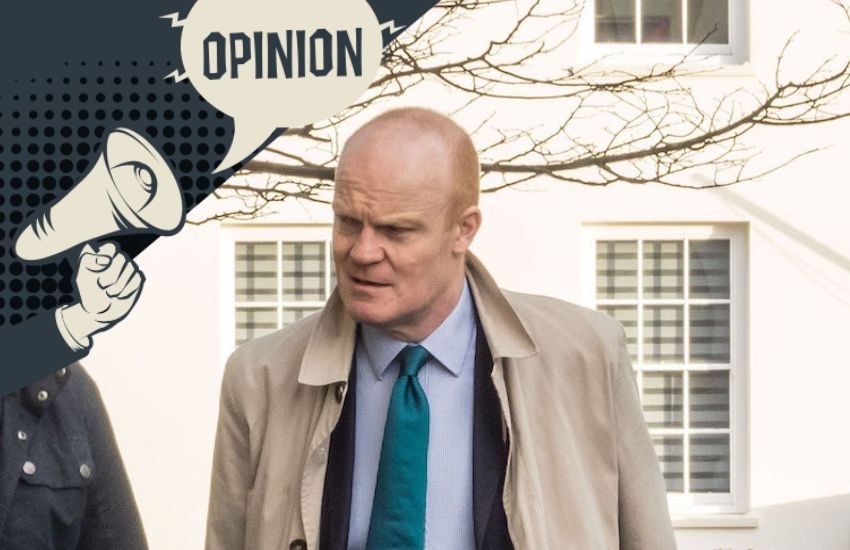


Deputy Gavin St Pier gives his analysis of last week's States debate:
"'Unprecedented,' was the verdict of Deputy Lyndon Trott, a former Chief Minister with 23 years’ experience. And it was, in so many ways.
"But let’s start at the end, with the Committee for Education, Sport & Culture’s (ESC’s) motion to withdraw their ill-fated policy letter entitled ‘Education Law Review.’ It was an ignominious retreat, having lost all amendments debated up to that point – and with every prospect of losing the ones still to be debated. The President, Deputy Andrea Dudley-Owen, used conciliatory language in welcoming debate – ironically whilst seeking to end it - and recognising the democratic will of the States, but the tone and body language could not conceal her frustration and anger at the situation in which ESC found itself. This had been on display at 930 on Friday morning, when she asked for an hour’s recess – ‘or quite possibly more’ she tetchily threatened - for ESC to work out its position.
"A recess of this length was itself ‘unprecedented’ as recesses are normally for no more than 10 or 20 minutes. States’ members reluctantly agreed, understandably irritated that this loss of time would not have been needed had the Committee met the night before or before the States sat on Friday morning. And how long was really needed anyway to decide to do what was the blindingly obvious response in their situation, namely to withdraw the policy letter? After an hour, ESC didn’t even manage to do that properly, having to be reminded by the Bailiff that the rules required a written motion. It took another 75 tortuous and avoidable minutes to get this one sentence motion in front of members – just enough time to lose another couple of amendments. And then finally the pain was over and everyone could go home for lunch.
"Deputy Heidi Soulsby had described the whole debate as a “car crash,” which was just another way of expressing Deputy Trott’s view that the policy letter had been “mauled.” Whilst we’ve already had a number of debates in this States’ term that could meet that description, including the two on the tax review, what made this one unprecedented was the scale of the car crash or the extent of the mauling. It wasn’t just that ESC lost every amendment that they opposed but they lost them by huge majorities. On one, although apparently opposed by the committee, only the President and Vice President (Deputy Sam Haskins) voted against.
"The man of the match was Deputy Trott, having demonstrated his experience and offered a masterclass in how to win an argument. Together with Deputy Simon Fairclough, his seconder and wingman, he led the first amendment to be debated. It was a long, detailed and technical amendment to protect the independent colleges, of whom Deputy Trott is one of the most consistent, effective and vocal proponents. Most of us would have attempted to sell our position by explaining the need for each change, which would have risked losing and boring our target audience. Like Barnes-Wallis with his dam-busting bouncing bomb, Deputy Trott reassured members they didn’t really need to understand all the technical detail of how his amendment worked, they just needed to believe it would. He and Deputy Fairclough sold a simple emotional argument: the independent colleges are exemplars whose performance would be threatened by an overly controlling and centralising force at ESC’s home base - and the amendment would stop that. The more Deputy Dudley-Owen and her team said that this was not the case, the more it sounded like they were protesting too much. ESC were fighting a perception, right or wrong, but a long held and deeply ingrained one, that the educational bureaucracy cannot help itself in its desire to meddle and control. A perception reinforced by a governance model that looked weak with its proposal to create a web of ‘governance boards’ for States’ schools with few real powers to govern.
"In another unprecedented moment – at least in my memory – the Bailiff allowed individual votes on each of the 17 propositions in the amendment. Normally, an amendment stands or falls in its entirety, with votes only being taken on individual propositions during the final votes at the end of the debate. This effectively turned a single amendment into 17 amendments and a single win into 17 stupendous wins for Deputies Trott and Fairclough. Once the dam had been breached by these 17 bouncing bombs, the flood waters swept all the subsequent amendments with them to victory.
"In previous Assemblies, defeats such as this – or indeed those of P&R on the tax review – would have led to honourable resignations from or of the committees, in the absence of which, motions of no confidence would have been laid to remove committees who had so demonstrably failed to obtain support for their flagship policies. In this States, the defeated team grumpily but unashamedly retreats with their bat and ball to the pavilion, complaining that the crowd has treated them so rudely. There, over tea taken by committee members in different rooms, they hatch a cunning plan to come out in different coloured kit and re-play the same match, in the hope that the crowd will give them a more welcome reception. This is a ‘one-more-push’ theory of politics based on the premise that States’ members don’t understand and must simply be made to understand. Deputy Dudley-Owen illustrates this theory by repeatedly telling colleagues that the issue is ‘complex.’ But all political problems are complex: the tax review, the electricity strategy, housing policy, development on the east coast, long-term care, to name a few. That is the nature of politics. If the problems were easy to solve, they wouldn’t be problems.
"22nd June 2023. Exactly two years to the next general election. Which means that it is now less than two years until this unprecedented States is over."